雅思口语替换句型
雅思口语让考官耳目一新的表达方法
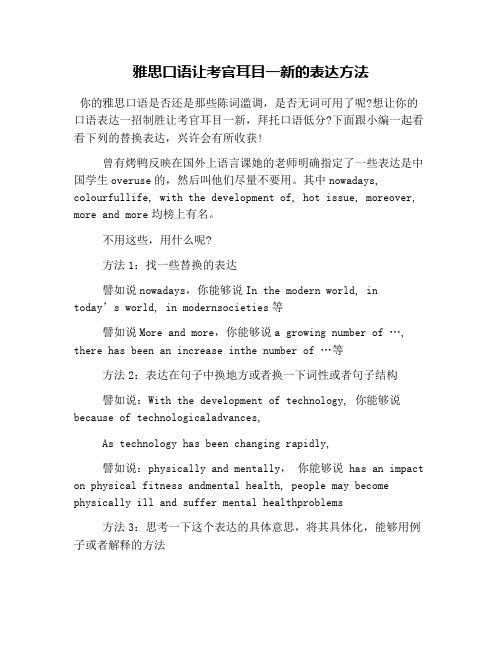
雅思口语让考官耳目一新的表达方法你的雅思口语是否还是那些陈词滥调,是否无词可用了呢?想让你的口语表达一招制胜让考官耳目一新,拜托口语低分?下面跟小编一起看看下列的替换表达,兴许会有所收获!曾有烤鸭反映在国外上语言课她的老师明确指定了一些表达是中国学生overuse的,然后叫他们尽量不要用。
其中nowadays, colourfullife, with the development of, hot issue, moreover, more and more均榜上有名。
不用这些,用什么呢?方法1:找一些替换的表达譬如说nowadays,你能够说In the modern world, intoday’s world, in modernsocieties等譬如说More and more,你能够说a growing number of …, there has been an increase inthe number of …等方法2:表达在句子中换地方或者换一下词性或者句子结构譬如说:With the development of technology, 你能够说because of technologicaladvances,As technology has been changing rapidly,譬如说:physically and mentally,你能够说 has an impact on physical fitness andmental health, people may become physically ill and suffer mental healthproblems方法3:思考一下这个表达的具体意思,将其具体化,能够用例子或者解释的方法譬如说:colourful life,说到底就是人生比较丰富,活动比较多,那么你就能够说 these activities can enrichtheir lives and offer them many options in free time.譬如说:improve qualities,说到底素质就是一个人的品质,如何解决问题,品质比较高尚等,那么你能够说they will becomecompassionate and sociable people with a strong moral compass.方法4:直接去掉某些表达,譬如说nowadays, hot issue, datable issue 等这些表达很多学生觉得不写没东西写,觉得好像缺了什么。
雅思口语替换句型教学文案

雅思口语替换句型雅思口语替换句型1. Talking About Personal HabitsExample question: What do you usually do in the evenings?I usually……I often……While I'm studying I usually……Sometimes I…….As a rule,I……Whenever I can I……2. Expressing Likes and DislikesExample question: What kinds of music do you like?My favourite …… is……I like……I enjoy……I'm (quite/rather) keen on……I just love……I absolutely adore…….I'm crazy about……I'm addicted to……I'm really into……I don't mind……As far as……is concerned,I can take it or leave it.I don't care too much for…… = I'm not really into……My least favourite……is……I dislike……I can't stand……I hate…… (extreme language)I find……3. Expressing Reasons for Likes and Dislikes……because…………since……The main reason I like……is that it's……What I like best about……is……The thing I like best about……is……The best/worst thing about…… is……I don't like that very much because it's too……That's because I find it……4. Expressing a PreferenceExample question: Do you (or,would you) prefer to travel alone or with others? (e.g.a friend)I prefer…… becauseMy preference is…… because……I prefer A to B because……If I had the choice,I'd + V…… because…… (假设的话)If I had the choice,I'd rather + V……because…… (假设的话)If I have the choice,I'll + V……(a real possibility for the future)5. ComparingExample question:What are the differences between modern art in China andtraditional Chinese art?A is bigger than B.B is not as big as A.You can also use some of these:Use “much” as in,“A is much better / worse than B”.“A is not nearly as good as B.”“B is nowhere near as big as A”“A is not quite as important as B.”“A is almost as important as B,but not quite.”“In comparison to B,A is quite big.” Or,“A is quite big in comparison to B”.“Compared to B,A is a lot bigger.”6. Talking About Recent Changes= Comparing the recent past and the presentExample question:Has your hometown changed much in the past few years?(e.g. 20 years)Yes,it has. For example,……Today there are many more cars on the roads than there were thirty years ago.(…… there are/is more_____ than there were/was…….)The air pollution is much worse/much better than it used to be.( ______ is more ____ than it used to be.)Compared to thirty years ago,the population of the city has increased by about two million.(Compared to thirty years ago,_______ has + 过去分词)The population of the city has increased by about two million people in the last thirty years.(______ has + 过去分词 in the last thirty years)More people today own a car than was the case thirty years ago.(More _________ today + present tense than was the case thirty years ago.)Today,more and more people are living in high-rise apartment buildings whereas thirty years ago,we had very few high-rise apartments buildings in our city.(Today ______ are + 现在分词 whereas thirty years ago + past tense)More and more large-scale supermarkets are being built nowadays but there were very few of them in my hometown thirty years ago(More and more ________ are being + 过去分词 nowadays but + past tensethirty years ago.)7. ContrastingThe question is usually 'a compare question'. When you answer one of these questions,you can use a contrasting statement. However,since the grammar of the comparing answers (see above) is more difficult,you will impress the examiner more by mostly using that,rather than by using contrasting statements.Example: "A is big but B is small."(____ is _____ but _____ is ____)8. SuggestingExample questions:What would you suggest a visitor to your country see anddo?What do you think the government could/should do?I'd……(suggest,recommend,say,tell him/her/them)…….Maybe/perhaps/possibly…… + could / should……It might/may help if…….+ past tense form of verbIt would probably + (be a good idea,be useful,help) if + past tense form of verbI……(suggest,recommend,say)…….9. Expressing OpinionsExample question:Do you think that children should always be offered an incentive (a reward of some kind) when parents ask their children to do something?I think……I believe……I feel……Personally,I (think,believe,feel)……I tend to + (think,feel,believe) that……In my opinion,……In my view,……I've always + (thought/believed/felt) that……I maintain that……I've always maintained that……It seems to me that……I'm convinced that……As far as I'm concerned,……My view is that……From my point of view,……To my mind,……The way I see it,……As I see it,……10. Giving Reasons for Opinions……because…………since……The main reason I say that is because ……One of the reasons I say that is because…… (One reason I say that is because…… ) 11. ExplainingExample question: Why are many older people reluctant to learn computer skills?The reason why…… is because / is that……The main reason why…… is because / is that……One reason why…… is because / is that……One possible explanation (for that) is……To understand why……..,you first need to…….. (understand,know,be aware that)Well,it's like this:…….You could look at it this way:……12. Speculating ( = Guessing When You Don't Know)(When talking about the present or the past)Example question: Do old people in China have opportunities to attend any forms of classes?Well,I'm not sure but……Well,I've never thought about that before but……I imagine……I guess……I suppose……I'd say ..13. Speculating ( = guessing) About the Future(Most commonly,how the future will change,compared to now.)Example question: How do you think the tourist industry (in China) will develop in the future?I predict…… + a nounI (can) foresee…… + [a noun + 现在分词] or + a nounI imagine / suppose / guess ………… will + adverb (or,adverb + will)…… be (present tense) likely to………… be (present tense) bound to………… be (present tense) + going to + V (原形动词) = "will" + V (原形动词) There’ll probably / possibly be……We might see / have………… will be + 现在分词………… might be + 现在分词……I'd be surprised if + past tense/past continuous tenseI'll be very surprised if + present tense/past continuous tenseI expect ..14. Expressing Plans,Intentions and Hopes for the FutureExample question: What are your future work plans? (after you graduate) I plan to……My plan is to……I plan on + Ving (动名词)I intend to……I hope to……I'm going to……My ambition is to……My immediate goal is to……My ultimate (= final) goal is to……Ultimately,……Hopefully,……Ideally,……I expect to……I’d like to…… = I want to ..As an alternative,I might……If all goes well,I'll / I should……If everything goes according to plan,I'll / I should……My dream is to……It's always been my hope/plan/ambition/dream to……My heart is set on + Ving (动名词)15. ClarifyingWhat I mean is……My meaning is……In other words,That is to say,……Let me put that another way.To put that another way,……What I'm trying to say is……My point is that……More specifically,……For example,……For instance,……16. Explaining a Word When you have Forgotten (or don't know) the Word "I can't remember the word but……..it's a thing that……it's a type of……it's something you……he's a person who……it's something like……it's similar to……it's kind of like a……"These sentences use the present tense because you are speaking in general. For example,"It's a thing,a tool that you use to put air into your bicycle tyre - you useit like this" (Show the action). (a bicycle pump)17. Speaking in GeneralOn the whole,……As a rule,……In general,Generally,……Generally speaking,……For the most part,……Typically,Usually,。
雅思托福替换词大全

雅思托福替换词大全雅思和托福考试是世界上最受欢迎的英语语言能力考试之一。
在阅读和写作部分,考生经常需要使用替换词来提高语言的表达能力和丰富词汇量。
本文将为大家提供一份雅思托福替换词大全,帮助大家在考试中提高得分。
一、替换人称代词和名词1. he/she → the individual2. I → the writer/author3. you → the reader4. people → individuals/persons5. students → learners6. teachers → educators7. children → youngsters8. parents → guardians9. workers → employees10. government → authorities二、替换动词1. show → indicate/reveal2. say → mention/state3. think → believe/consider4. give → provide5. use → utilize6. help → assist7. make → create8. understand → comprehend9. improve → enhance10. learn → acquire三、替换形容词和副词1. good → excellent/outstanding2. bad → terrible/horrible3. important → significant4. interesting → fascinating5. difficult → challenging6. easy → simple7. big → substantial8. small → tiny9. beautiful → gorgeous10. quickly → rapidly四、替换连词和副词1. however → nevertheless/nonetheless2. because → due to/owing to3. but → yet/however4. and → in addition/furthermore5. so → therefore/consequently6. also → m oreover7. firstly/secondly → first/second8. then → next9. finally → lastly10. for example → for instance五、替换名词短语1. a lot of → a great deal of2. in conclusion → in summary3. in my opinion → from my perspective4. a long time ago → in the past5. a large number of → numerous6. on the other hand → conversely7. as a result → consequently8. at the present time → currently9. due to the fact → because10. in order to → to六、替换句型1. It is believed that → It is widely accepted that2. It is said that → According to3. In conclusion → To sum up4. It can be seen that → It is evident that5. It is clear that → There is no doubt that6. It is important to note that → It should be emphasized that7. It is necessary to → It is crucial to8. It is commonly tho ught that → It is generally acknowledged that9. It is worth mentioning that → It is worth noting that10. It is true that → Undoubtedly以上是一份雅思托福替换词大全,考生们可以根据自己的需要来选择适合的词汇替换。
雅思口语:高分替换词篇

雅思口语:高分替换词篇1.can not but/ can’t help but 替换have to doI could not but (had to) go home.2.more often than not 替换usuallyMore often than not (Usually), the meaning of many words can be easily guessed.3.lest 替换so that/ in order thatI wrote down his telephone number so that I would not forget it.→I wrote down his telephone number lest I(should) forget it.4.be long for sth/ be long to do sth替换want to do sth /wish forI want to see you very much.→I am long to see you.5.be caught up in/be crazy about/be absorbedin/ be addicted to 替换be interested inHe is caught up in( very interested in )collecting stamps.6.more than 替换veryI'm very glad to learn that you are coming in September.→I'm more than glad to learn that you are coming in September.7.perfect(ly) 替换good/ very wellHe speaks perfect ( good)English./He speaks English perfectly( very well )8.do sb a/the favor 替换helpWould you please do me the favor (help me) to turn down the radio?9.the other day 替换a few days agoThe other day my brother and I went to the cinema by bicycle.10.in the course of 替换duringIn the course of ( during) the mountain climbing, please help each other and pay special attention to your safety.11.the majority of替换mostThe majority of (Most of) the interviewees prefer watching TV at home to going to the cinema.12.consist of替换be made up ofOur class consists of (is made up or) 50 students.13.be worn out替换be tired/ brokenAfter five hours' non-stop work, we were all worn out (tired).My shoes are worn out (broken). Please buy me a new pair.14.become of替换happenWhat do think has become of (happened to) him?15.express one's satisfaction with替换be satisfied withThe majority of (Most of) the interviewees prefer watching TV at home to going to the cinema.。
雅思口语中常见的同义表达
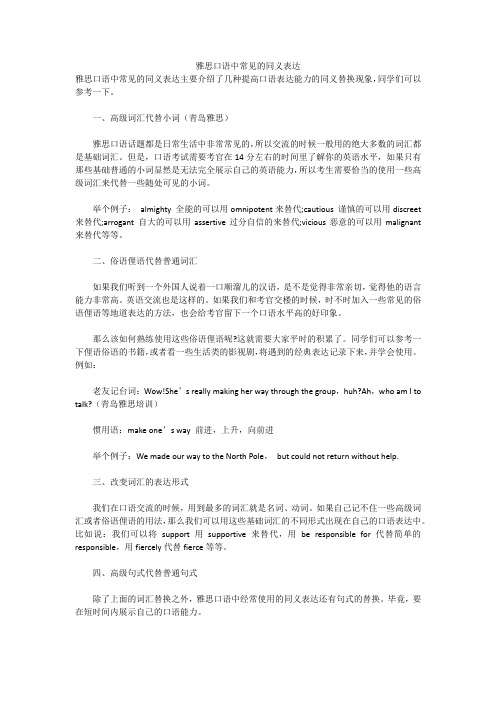
雅思口语中常见的同义表达雅思口语中常见的同义表达主要介绍了几种提高口语表达能力的同义替换现象,同学们可以参考一下。
一、高级词汇代替小词(青岛雅思)雅思口语话题都是日常生活中非常常见的,所以交流的时候一般用的绝大多数的词汇都是基础词汇。
但是,口语考试需要考官在14分左右的时间里了解你的英语水平,如果只有那些基础普通的小词显然是无法完全展示自己的英语能力,所以考生需要恰当的使用一些高级词汇来代替一些随处可见的小词。
举个例子:almighty 全能的可以用omnipotent来替代;cautious 谨慎的可以用discreet 来替代;arrogant 自大的可以用assertive过分自信的来替代;vicious恶意的可以用malignant 来替代等等。
二、俗语俚语代替普通词汇如果我们听到一个外国人说着一口顺溜儿的汉语,是不是觉得非常亲切,觉得他的语言能力非常高。
英语交流也是这样的。
如果我们和考官交楼的时候,时不时加入一些常见的俗语俚语等地道表达的方法,也会给考官留下一个口语水平高的好印象。
那么该如何熟练使用这些俗语俚语呢?这就需要大家平时的积累了。
同学们可以参考一下俚语俗语的书籍,或者看一些生活类的影视剧,将遇到的经典表达记录下来,并学会使用。
例如:老友记台词:Wow!She’s really making her way through the group,huh?Ah,who am I to talk?(青岛雅思培训)惯用语:make one’s way 前进,上升,向前进举个例子:We made our way to the North Pole,but could not return without help.三、改变词汇的表达形式我们在口语交流的时候,用到最多的词汇就是名词、动词。
如果自己记不住一些高级词汇或者俗语俚语的用法,那么我们可以用这些基础词汇的不同形式出现在自己的口语表达中。
雅思口语和写作的替换词汇归纳

雅思口语和写作的替换词汇归纳雅思口语和写作的替换词汇归纳通过雅思考试可以体现我们的英语学习能力,更能够为大家未来求职带来便利。
以下是店铺为大家搜索整理的`雅思口语和写作的替换词汇归纳,希望能给大家带来帮助!1. important = crucial (extremely important), significant (amount or effects large enough to be important)2. common = universal, ubiquitous (if something is ubiquitous, it seems to be every where)3. abundant = ample (enough and usually extra), plentiful (enough for people's needs and wants)4. stick = adhere, cling (hold on something tightly)5. neglect = ignore. (difference: neglect means someone has not paid enough attention to something; ignore means no attention.)6. near = adjacent (two things next to each other), adjoin (the same as adjacent)7. pursue = woo (man woos woman, old-fashioned), seek (if you seek sth, you try to obtain it. FORMAL)8. accurate = precise (precise is exact and accurate in all details), exact (correct in every detail)9. vague = obscure (unknown or known by only a few people)10. top = peak, summit11. competitor = rival, opponent (especially in sports and politics)12. blame = condemn (if you condemn something, you say it is very bad and unacceptable)13. opinion = perspective, standpoint (means looking at an event or situation in a particular way)14. fame = prestige (describe those who are admired), reputation15. build = erect (you can erect something as buildings, FORMAL), establish16. insult = humiliate (do something or say something which makes people feel ashamed or stupid)17. complain = grumble (complain something in a bad-tempered way)18. primary = radical (very important and great in degree), fundamental19. relieve = alleviate (alleviate means you make pain or sufferings less intense or severe)20. force = coerce into (coerce means you make someone do something she/he does not want to), compel21. enlarge = magnify (magnify means make something larger than it really is)22. complex = intricate (if something is intricate, it often has many small parts and details)23. Lonely = solitary (if someone is solitary, there is no one near him/her)24. small = minuscule (very small), minute,25. praise = extol (stronger than praise), compliment(polite and political)26. hard-working = assiduous (someone who is assiduous works hard or does things very thoroughly)27. difficult = arduous (if something is arduous, it is difficult and tiring, and involves a lot of efforts)28. poor (soil) = barren, infertile (used to describe the soil is so poor that plants cannot be planted on it)29. fragile = brittle, vulnerable (someone who is vulnerableis easily hurt emotionally or physically)30. show = demonstrate (to demonstrate a fact means to make it clear to people.)31. big = massive (large in size, quantity, or extent), colossal (use this word, you emphasize something’s large), tremendous (informal)32. avoid = shun (if someone shuns something, she/he deliberately avoid that something or keep away from it.)33. fair = impartial (someone who is impartial is able to givea fair opinion or decision on something.)34. attack = assault (physically attack someone), assail (attack violently)35. dislike = abhor (abhor means you hate something to a extreme extent for moral reasons), loathe (dislike very much)36. ruin = devastate (it means damage something very badly, or utterly destroy it.)37. always = invariably (the same as always, but better than always)38. forever = perpetual (a perpetual state never changes), immutable (something immutable will never change or be changed)39. surprise = startle (it means surprise you slightly), astound (surprise you to a large degree), astonish(the same as astound)40. enthusiasm = zeal (a great enthusiasm), fervency (sincere and enthusiasm)41. quiet = tranquil (calm and peaceful), serene (calm and quiet)42. expensive = exorbitant (it means too expensive that it should be)43. luxurious = lavish (impressive and very expensive),sumptuous (grand and very expensive)44. boring = tedious (if you describe something tedious, you mean it is boring and frustrating)45. respect = esteem (if you esteem someone, you respect and admire him/her. FORMAL)46. worry = fret (if you fret about something, you worry about it)47. cold = chilly (unpleasantly cold), icy (extremely cold)48. hot = boiling (very hot)49. dangerous = perilous (very dangerous, hazardous) (dangerous, especially to people's safety and health)50. only = unique (the only one of its kind), distinctive;51. stop = cease (if something ceases, it stops happening or existing)52. part = component (the components of something are the parts that it is made of)53. result = consequence (the results or effects of something)54. obvious = apparent, manifest55. based on = derived from (can see or notice them very easily)56. quite = fairly57. pathetic = lamentable (very uncomfortable and disappointing)58. field = domain (a particular field of thought, activities or interest)59. appear = emerge (come into existence)60. whole = entire (the whole of something)61. wet = moist (slightly wet), damp (slightly wet), humid (very damp and hot)62. wrong = erroneous (incorrect or partly correct)63. difficult = formidable64. change = convert (change into another form)65. typical = quintessential (this word means represent a typical example of something)66. careful = cautious (very careful in order to avoid danger), prudent(careful and sensible)67. ability = capacity, capability (the same as ability)68. strange = eccentric (if some one is eccentric, she/he behaves in a strange way, or his/her opinion is different from most people)69. rich= affluent (if you are affluent, you have a lot of money)70. use = utilize (the same as use)71. dubious = skeptical (if you are skeptical about something, you have doubts on it.)72. satisfy = gratify (if you are gratified by something, it gives you pleasure and satisfaction)73. short = fleeting, ephemeral (if something is ephemeral, it lasts a short time)74. Scholarship = fellowship75. smelly = malodorous (used to describe an unpleasant smell)76. ugly = hideous (if something is hideous, it is very ugly or unattractive)77. attractive = appealing (pleasing and attractive), absorbing (something absorbing can attract you a great deal)78. diverse = miscellaneous (a miscellaneous groups consists of many different kinds of things)79. disorder = disarray, chaos80. crazily = frantically (used to describe someone who behaves in a wild and uncontrolled way)81. rapid = meteoric (ATTENTION: meteoric is only used to describe someone achieves success quickly)82. ordinary = mundane (very ordinary and not at interesting or unusual)83. despite = notwithstanding (FORMAL)84. best = optimal (used to describe the best level something can achieve)85. sharp = acute (severe and intense)86. unbelievable = inconceivable (if you deem something inconceivable, you think it very unlike to happen )87. puzzle = perplex (something perplex someone means it confuses and worries him/her because he/she does not understand it)88. method = avenue (a way of getting something done)89. famous = distinguished (used to describe people who are successful in their career)90. ancient = archaic (extremely old and extremely old-fashioned)91. decorate = embellish (embellish means make something look more attractive via decorating it with something else)92. possible = feasible (if something is feasible, it can be done, made or achieved)93. so = consequently, accordingly94. rare = infrequent (doesn’t happen often)95. greedy = rapacious (greedy and selfish)96. individuals,characters, folks = people,persons97. nowadays = currently98. dreadful, unfavorable, poor, adverse, ill = be less impressive99. reap huge fruits = get many benefits100. for my part, from my own perspective = in my opinion。
雅思口语同义替换汇总

雅思口语同义替换汇总1. 同义替换是什么?同义替换是指将一个单词或短语替换为具有相同或相似意义的另一个单词或短语,以丰富口语表达,使语言更生动有趣。
2. 为什么要使用同义替换?使用同义替换可以避免重复使用相同的单词或短语,提升口语表达的多样性。
此外,同义替换还能展示语言的灵活运用,让口语更具吸引力和独特性。
3. 同义替换的常见技巧3.1 同义词替换同义词替换是最常见的同义替换技巧之一。
例如:- Good替换为excellent, great, wonderful等- Bad替换为terrible, awful, horrible等3.2 词组替换除了单个单词的替换,词组替换也是同义替换的一种常见形式。
例如:- In my opinion替换为I think, from my perspective等- Very important替换为crucial, significant等3.3 句型替换在口语表达中,句型替换也是一种实用且有效的同义替换方式。
例如:- I believe替换为I reckon, I suppose等- It's difficult替换为It's challenging, It's not easy等3.4 并列句替换当想要表达多个观点、事物或感受时,可以使用并列句替换,使口语更有层次感和连贯性。
例如:- I like apples and bananas替换为I enjoy both apples and bananas4. 同义替换的注意事项在进行同义替换时,需要注意以下几点:- 确保替换后的词或短语与原词的意义相同或相近。
- 避免使用不常见或不常规的同义词,以免让听者产生困惑。
- 不要过度使用同义替换,适度运用能提高口语表达,过度运用则可能显得不自然。
5. 总结同义替换是提升口语表达多样性和灵活性的有效方法。
通过使用同义替换技巧,可以使口语更具吸引力和趣味性。
雅思口语这些高频替换句型你必须收下
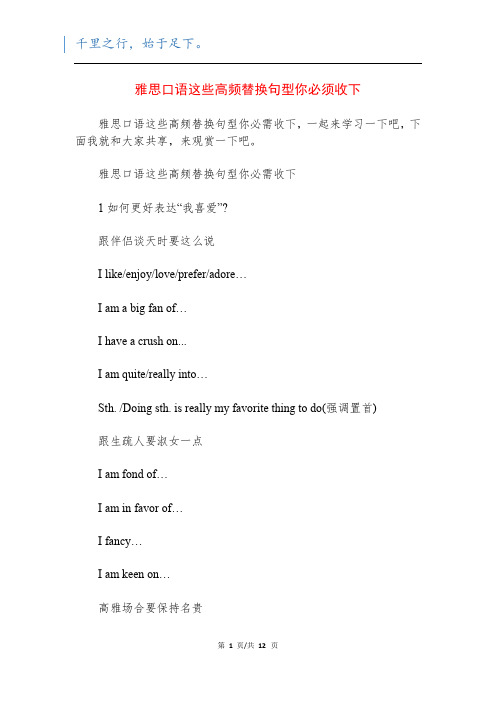
雅思口语这些高频替换句型你必须收下雅思口语这些高频替换句型你必需收下,一起来学习一下吧,下面我就和大家共享,来观赏一下吧。
雅思口语这些高频替换句型你必需收下1如何更好表达“我喜爱”?跟伴侣谈天时要这么说I like/enjoy/love/prefer/adore…I am a big fan of…I have a crush on...I am quite/really into…Sth. /Doing sth. is really my favorite thing to do(强调置首)跟生疏人要淑女一点I am fond of…I am in favor of…I fancy…I am keen on…高雅场合要保持名贵I like A better than BI have a preference for…I prefer A to B2如何更好表达“我想,我认为”?淡定式In terms of…, I think that…When it comes to…, I just consider that… Speaking of…, I feel/find that… Regarding to…, my point is that…It occurs to me that…“要死要活”式Personally, it seems to me that…From my perspective, I strongly believe that… It is my belief that…写作时要保持高大上To put it simply, …Well, obviously/apparently…3如何更好表达“我能做某事”? 当表达“我能干……”时Through sth., I could…Thanks to…, I am able to…I am capable of doing sth.当表达“某事给我机会做……”时Sth. enables me to…Sth. empowers me to…4如何更好表达“我盼望做某事”? “我盼望做某事”I hope/wish that…I am hoping that…Hopefully, I would/could…I expect that…How I wish I could…As long as I could…, I would… 雅思官方口语备考6大重点1. Give full answers一个答案的完整性是考官在口语考试中最看重的。
雅思口语同义替换汇总
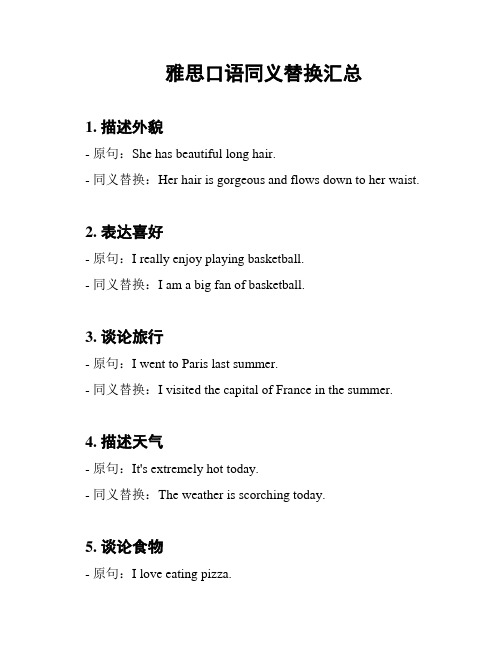
雅思口语同义替换汇总1. 描述外貌- 原句:She has beautiful long hair.- 同义替换:Her hair is gorgeous and flows down to her waist.2. 表达喜好- 原句:I really enjoy playing basketball.- 同义替换:I am a big fan of basketball.3. 谈论旅行- 原句:I went to Paris last summer.- 同义替换:I visited the capital of France in the summer.4. 描述天气- 原句:It's extremely hot today.- 同义替换:The weather is scorching today.5. 谈论食物- 原句:I love eating pizza.6. 谈论研究- 原句:I study in a prestigious university.- 同义替换:I am enrolled in a renowned educational institution.7. 描述节日- 原句:Christmas is a joyful holiday.- 同义替换:Christmas is a festive celebration.8. 谈论书籍- 原句:I just finished reading a fascinating novel.9. 表达意见- 原句:I strongly believe that education should be free.- 同义替换:I firmly hold the view that education should be accessible to all without charge.10. 谈论社交媒体- 原句:I use Instagram to share photos with my friends.- 同义替换:I utilize Instagram as a means to share images and connect with friends.。
剑桥雅思14同义替换整理

剑桥雅思14同义替换整理全文共四篇示例,供读者参考第一篇示例:雅思考试是全球最受欢迎的英语语言能力测试之一,它被认为是用于评估学生英语水平的最好方法之一。
剑桥雅思14是最新的一套雅思考试模拟题,它涵盖了写作、口语、阅读和听力等各个方面,为考生提供了全面的测试和练习。
在剑桥雅思14中,同义替换是一个重要的考点,因为在考试中经常会出现一些同义句型,考生需要能够准确地理解和替换这些句子。
以下是剑桥雅思14中的一些同义替换整理,供考生参考:1. 原句:Many people believe that government should invest more money in arts education.同义替换:A lot of individuals are of the opinion that the government ought to allocate additional funds to arts education.第二篇示例:剑桥雅思14同义替换整理雅思考试是世界上最受欢迎的英语语言考试之一,每年有数百万人参加。
剑桥雅思14是雅思考试的一套备考资料,包括了听力、阅读、写作和口语四个部分,是备考雅思的学生们的重要参考资料之一。
在备考雅思的过程中,同义替换是一个非常重要的技巧,能够帮助考生更好地理解题目,提高答题速度和准确度。
1. 词汇替换在雅思考试中,词汇替换是一个非常重要的技巧。
在剑桥雅思14中,有很多常见的词汇替换,比如:- advantages = benefits- disadvantages = drawbacks- important = crucial- interesting = fascinating- problems = issues- solutions = remedies通过熟练掌握这些词汇替换,考生能够更好地理解题目,准确作答。
2. 句型替换3. 主题替换总结第三篇示例:剑桥雅思14同义替换整理剑桥雅思14是备考雅思的必备教材之一,其中的阅读、听力、写作、口语四大部分涵盖了广泛的话题,对于提高英语水平和应对雅思考试都有很大的帮助。
雅思口语写作常用100个替换词总结
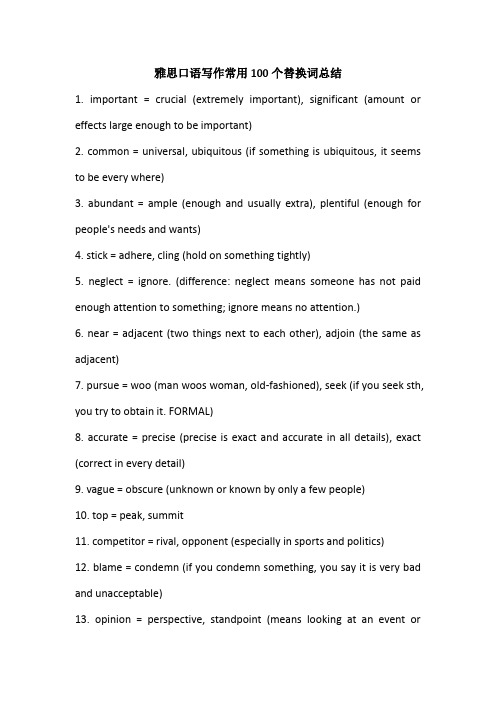
雅思口语写作常用100个替换词总结1. important = crucial (extremely important), significant (amount or effects large enough to be important)2. common = universal, ubiquitous (if something is ubiquitous, it seems to be every where)3. abundant = ample (enough and usually extra), plentiful (enough for people's needs and wants)4. stick = adhere, cling (hold on something tightly)5. neglect = ignore. (difference: neglect means someone has not paid enough attention to something; ignore means no attention.)6. near = adjacent (two things next to each other), adjoin (the same as adjacent)7. pursue = woo (man woos woman, old-fashioned), seek (if you seek sth, you try to obtain it. FORMAL)8. accurate = precise (precise is exact and accurate in all details), exact (correct in every detail)9. vague = obscure (unknown or known by only a few people)10. top = peak, summit11. competitor = rival, opponent (especially in sports and politics)12. blame = condemn (if you condemn something, you say it is very bad and unacceptable)13. opinion = perspective, standpoint (means looking at an event orsituation in a particular way)14. fame = prestige (describe those who are admired), reputation15. build = erect (you can erect something as buildings, FORMAL), establish16. insult = humiliate (do something or say something which makes people feel ashamed or stupid)17. complain = grumble (complain something in a bad-tempered way)18. primary = radical (very important and great in degree), fundamental19. relieve = alleviate (alleviate means you make pain or sufferings less intense or severe)20. force = coerce into (coerce means you make someone do something she/he does not want to), compel21. enlarge = magnify (magnify means make something larger than it really is)22. complex = intricate (if something is intricate, it often has many small parts and details)23. Lonely = solitary (if someone is solitary, there is no one near him/her)24. small = minuscule (very small), minute,25. praise = extol (stronger than praise), compliment(polite and political)26. hard-working = assiduous (someone who is assiduous works hard or does things very thoroughly)27. difficult = arduous (if something is arduous, it is difficult and tiring,and involves a lot of efforts)28. poor (soil) = barren, infertile (used to describe the soil is so poor that plants cannot be planted on it)29. fragile = brittle, vulnerable (someone who is vulnerable is easily hurt emotionally or physically)30. show = demonstrate (to demonstrate a fact means to make it clear to people.)31. big = massive (large in size, quantity, or extent), colossal (use this word, you emphasize something’s large), tremendous (informal)32. avoid = shun (if someone shuns something, she/he deliberately avoid that something or keep away from it.)33. fair = impartial (someone who is impartial is able to give a fair opinion or decision on something.)34. attack = assault (physically attack someone), assail (attack violently)35. dislike = abhor (abhor means you hate something to a extreme extent for moral reasons), loathe (dislike very much)36. ruin = devastate (it means damage something very badly, or utterly destroy it.)37. always = invariably (the same as always, but better than always)38. forever = perpetual (a perpetual state never changes), immutable (something immutable will never change or be changed)39. surprise = startle (it means surprise you slightly), astound (surpriseyou to a large degree), astonish(the same as astound)40. enthusiasm = zeal (a great enthusiasm), fervency (sincere and enthusiasm)41. quiet = tranquil (calm and peaceful), serene (calm and quiet)42. expensive = exorbitant (it means too expensive that it should be)43. luxurious = lavish (impressive and very expensive), sumptuous (grand and very expensive)44. boring = tedious (if you describe something tedious, you mean it is boring and frustrating)45. respect = esteem (if you esteem someone, you respect and admire him/her. FORMAL)46. worry = fret (if you fret about something, you worry about it)47. cold = chilly (unpleasantly cold), icy (extremely cold)48. hot = boiling (very hot)49. dangerous = perilous (very dangerous, hazardous) (dangerous, especially to people's safety and health)50. only = unique (the only one of its kind), distinctive;51. stop = cease (if something ceases, it stops happening or existing)52. part = component (the components of something are the parts that it is made of)53. result = consequence (the results or effects of something)54. obvious = apparent, manifest55. based on = derived from (can see or notice them very easily)56. quite = fairly57. pathetic = lamentable (very uncomfortable and disappointing)58. field = domain (a particular field of thought, activities or interest)59. appear = emerge (come into existence)60. whole = entire (the whole of something)61. wet = moist (slightly wet), damp (slightly wet), humid (very damp and hot)62. wrong = erroneous (incorrect or partly correct)63. difficult = formidable64. change = convert (change into another form)65. typical = quintessential (this word means represent a typical example of something)66. careful = cautious (very careful in order to avoid danger), prudent(careful and sensible)67. ability = capacity, capability (the same as ability)68. strange = eccentric (if some one is eccentric, she/he behaves in a strange way, or his/her opinion is different from most people)69. rich= affluent (if you are affluent, you have a lot of money)70. use = utilize (the same as use)71. dubious = skeptical (if you are skeptical about something, you have doubts on it.)72. satisfy = gratify (if you are gratified by something, it gives you pleasure and satisfaction)73. short = fleeting, ephemeral (if something is ephemeral, it lasts a short time)74. Scholarship = fellowship75. smelly = malodorous (used to describe an unpleasant smell)76. ugly = hideous (if something is hideous, it is very ugly or unattractive)77. attractive = appealing (pleasing and attractive), absorbing (something absorbing can attract you a great deal)78. diverse = miscellaneous (a miscellaneous groups consists of many different kinds of things)79. disorder = disarray, chaos80. crazily = frantically (used to describe someone who behaves in a wild and uncontrolled way)81. rapid = meteoric (ATTENTION: meteoric is only used to describe someone achieves success quickly)82. ordinary = mundane (very ordinary and not at interesting or unusual)83. despite = notwithstanding (FORMAL)84. best = optimal (used to describe the best level something can achieve)85. sharp = acute (severe and intense)86. unbelievable = inconceivable (if you deem something inconceivable,you think it very unlike to happen )87. puzzle = perplex (something perplex someone means it confuses and worries him/her because he/she does not understand it)88. method = avenue (a way of getting something done)89. famous = distinguished (used to describe people who are successful in their career)90. ancient = archaic (extremely old and extremely old-fashioned)91. decorate = embellish (embellish means make something look more attractive via decorating it with something else)92. possible = feasible (if something is feasible, it can be done, made or achieved)93. so = consequently, accordingly94. rare = infrequent (doesn’t happen often)95. greedy = rapacious (greedy and selfish)96. individuals,characters, folks = people,persons97. nowadays = currently98. dreadful, unfavorable, poor, adverse, ill = be less impressive99. reap huge fruits = get many benefits100. for my part, from my own perspective = in my opinion。
雅思口语之高级句式替换词汇

雅思口语之高级句式替换词汇1.不仅仅...而且...not only...but also...例如:Not only are they useful in the office, but they are also great for quick and simple meals at home.2.避免... avoids...例如:Avoid using plastic bags as much as possible, and use reusable bags instead.3.有时... sometimes...例如: Sometimes I like to go for a run in the morning, but other times I prefer to sleep in.4.不仅...而且... not only...but also...例如: Not only are there various types of tea, but also each type has its own unique flavor and aroma.5.不仅可以...而且可以...not only can...but also can...例如: This car is not only fast, but it can also get excellent gas mileage.6.可能... potentially...例如: This treatment could potentially be used to cure various forms of cancer.7.不仅...而且... not only...but also...例如: Not only are they delicious, but they are also very healthy.8.因为... as a result of...例如: As a result of climate change, the Arctic ice is melting at an accelerated rate.9.为了... in order to...例如: In order to lose weight, I started eatinga low-calorie diet and doing exercise every day.10.虽然...但是... although...but...例如: Although I didn't study very hard, I still got a good grade on the exam.。
记住这20组口语高分替换词,你的雅思口语也能上7分
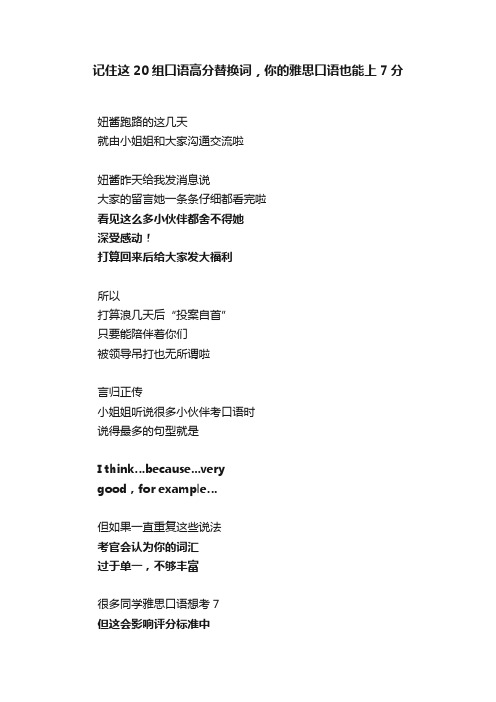
记住这20组口语高分替换词,你的雅思口语也能上7分妞酱跑路的这几天就由小姐姐和大家沟通交流啦妞酱昨天给我发消息说大家的留言她一条条仔细都看完啦看见这么多小伙伴都舍不得她深受感动!打算回来后给大家发大福利所以打算浪几天后“投案自首”只要能陪伴着你们被领导吊打也无所谓啦言归正传小姐姐听说很多小伙伴考口语时说得最多的句型就是I think…because...verygood,for example…但如果一直重复这些说法考官会认为你的词汇过于单一,不够丰富很多同学雅思口语想考7但这会影响评分标准中Lexical Resource的得分这是阻碍你得高分一个很重要的标准所以,小姐姐请来了我们的教研刘琪老师给大家总结了20组在口语考试中运用最多的同意替换词组和词汇表达冲破5.5分魔咒必备啊要想考官眼前一亮词汇的多样性和表达的丰富性必不可少I think → As far as I am co ncerned 等口语考试的 part 3 中经常会遇到Do you think……/What do you think……/In your opinion, what……这种形式的提问,甚至一次考试中会多次遇到这类问题,这时候往往一句 I think 会让你的表现大打折扣。
为了体现我们掌握的词汇的丰富程度,我们需要多种「我认为」的表达方式:★ As far as I am concerned 对我而言,从我的角度来说。
例句:As far as I am concerned, Joe's desk chair is a horror—a swivel affair with soft cushions.从我的角度来看,乔的那张办公椅——那张带有软垫的转椅,很可怕。
★ From my point of view/perspective 依我看,以我的观点看例句:From my perspective, once you enter into the realm of marriage, building and maintaining a successful marriage is actually a big part of personal and financial success.我觉得从踏入婚姻的城堡起,建立和维护一桩美满的婚姻便是个人和事业成功的一个重要部分。
雅思口语这些高频替换句型你必须收下
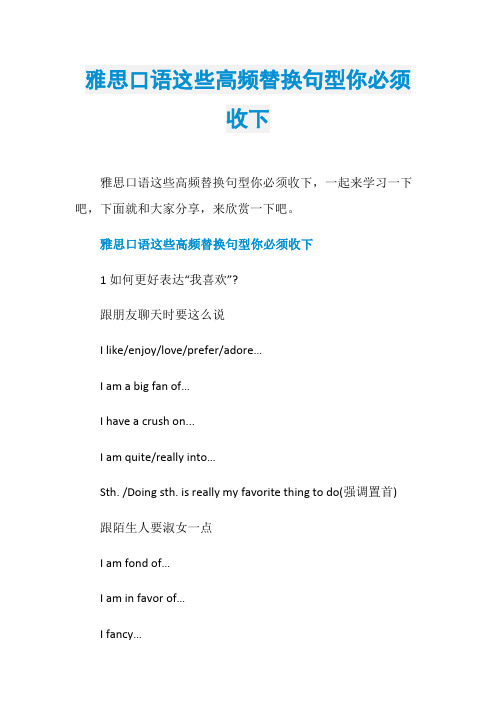
雅思口语这些高频替换句型你必须收下雅思口语这些高频替换句型你必须收下,一起来学习一下吧,下面就和大家分享,来欣赏一下吧。
雅思口语这些高频替换句型你必须收下1如何更好表达“我喜欢”?跟朋友聊天时要这么说I like/enjoy/love/prefer/adore…I am a big fan of…I have a crush on...I am quite/really into…Sth. /Doing sth. is really my favorite thing to do(强调置首)跟陌生人要淑女一点I am fond of…I am in favor of…I fancy…I am keen on…高雅场合要保持高贵I like A better than BI have a preference for…I prefer A to B2如何更好表达“我想,我认为”?淡定式In terms of…, I think that…When it comes t o…, I just consider that…Speaking of…, I feel/find that…Regarding to…, my point is that…It occurs to me that…“要死要活”式Personally, it seems to me that…From my perspective, I strongly believe that…It is my belief that…写作时要保持高大上To put it simply, …Well, obviously/apparently…3如何更好表达“我能做某事”?当表达“我能干……”时Through sth., I could…Thanks to…, I am able to…I am capable of doing sth.当表达“某事给我机会做……”时Sth. enables me to…Sth. empowers me to…4如何更好表达“我希望做某事”?“我希望做某事”I h ope/wish that…I am hoping that…Hopefully, I would/could…I expect that…How I wish I could…As long as I could…, I would…雅思官方口语备考6大重点1. Give full answers一个答案的完整性是考官在口语考试中最看重的。
雅思口语有哪些可以替换的高分连接词?
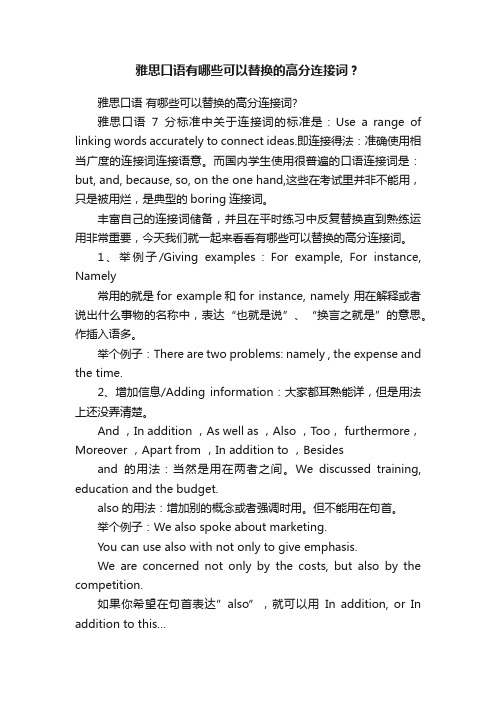
雅思口语有哪些可以替换的高分连接词?雅思口语有哪些可以替换的高分连接词?雅思口语7分标准中关于连接词的标准是:Use a range of linking words accurately to connect ideas.即连接得法:准确使用相当广度的连接词连接语意。
而国内学生使用很普遍的口语连接词是:but, and, because, so, on the one hand,这些在考试里并非不能用,只是被用烂,是典型的boring连接词。
丰富自己的连接词储备,并且在平时练习中反复替换直到熟练运用非常重要,今天我们就一起来看看有哪些可以替换的高分连接词。
1、举例子/Giving examples:For example, For instance, Namely常用的就是for example和for instance, namely 用在解释或者说出什么事物的名称中,表达“也就是说”、“换言之就是”的意思。
作插入语多。
举个例子:There are two problems: namely , the expense and the time.2、增加信息/Adding information:大家都耳熟能详,但是用法上还没弄清楚。
And ,In addition ,As well as ,Also ,Too, furthermore,Moreover ,Apart from ,In addition to ,Besidesand的用法:当然是用在两者之间。
We discussed training, education and the budget.also的用法:增加别的概念或者强调时用。
但不能用在句首。
举个例子:We also spoke about marketing.You can use also with not only to give emphasis.We are concerned not only by the costs, but also by the competition.如果你希望在句首表达”also”,就可以用In addition, or In addition to this…As well as 用法:可以用于句首或者中间。
雅思口语替换句型

雅思口语替换句型雅思口语替换句型1. Talking About Personal HabitsExample question:What do you usually do in the evenings?I usually……I often……While I'm studying I usually……Sometimes I…….As a rule,I……Whenever I can I……2. Expressing Likes and DislikesExample question:What kinds of music do you like?My favourite ……is……I like……I enjoy……I'm (quite/rather) keen on……I just love……I absolutely adore…….I'm crazy about……I'm addicted to……I'm really into……I don't mind……As far as……is concerned,I can take it or leave it.I don't care too much for……= I'm not really into……My least favourite……is……I dislike……I can't stand……I hate……(extreme language)I find……3. Expressing Reasons for Likes and Dislikes……because…………since……The main reason I like……is that it's……What I like best about……is……The thing I like best about……is……The best/worst thing about……is……I don't like that very much because it's too……That's because I find it……4. Expressing a PreferenceExample question:Do you (or,would you) prefer to travel alone or with others? (e.g.a friend)I prefer……becauseMy preference is……because……I prefer A to B because……If I had the choice,I'd + V……because……(假设的话)If I had the choice,I'd rather + V……because……(假设的话)If I have the choice,I'll + V……(a real possibility for the future)5. ComparingExample question:What are the differences between modern art in China and traditional Chinese art?A is bigger than B.B is not as big as A.You can also use some of these:Use “much”as in,“A is much better /worse than B”.“A is not nearly as good as B.”“B is nowhere near as big as A”“A is not quite as important as B.”“A is almost as important as B,but not quite.”“In comparison to B,A is quite big.”Or,“A is quite big in comparison to B”.“Compared to B,A is a lot bigger.”6. Talking About Recent Changes= Comparing the recent past and the present Example question:Has your hometown changed much in the past few years? (e.g. 20 years)Yes,it has. For example,……Today there are many more cars on the roads than there were thirty years ago.(……there are/is more_____ than there were/was…….)The air pollution is much worse/much better than it used to be.( ______ is more ____ than it used to be.)Compared to thirty years ago,the population of the city has increased by about two million.(Compared to thirty years ago,_______ has + 过去分词)The population of the city has increased by about two million people in the last thirty years.(______ has + 过去分词in the last thirty years)More people today own a car than was the case thirty years ago.(More _________ today + present tense than was the case thirty years ago.)Today,more and more people are living in high-rise apartment buildings whereas thirty years ago,we had very few high-rise apartments buildings in our city.(Today ______ are + 现在分词whereas thirty years ago + past tense)More and more large-scale supermarkets are being built nowadays but there were very few of them in my hometown thirty years ago(More and more ________ are being + 过去分词nowadays but + past tense thirty years ago.)7. ContrastingThe question is usually 'a compare question'. When you answer one of these questions,you can use a contrasting statement. However,since the grammar of the comparing answers (see above) is more difficult,you will impress the examiner more by mostly using that,rather than by using contrasting statements.Example:"A is big but B is small."(____ is _____ but _____ is ____)8. SuggestingExample questions:What would you suggest a visitor to your country see and do?What do you think the government could/should do?I'd……(suggest,recommend,say,tell him/her/them)…….Maybe/perhaps/possibly……+ could /should……It might/may help if…….+ past tense form of verbIt would probably + (be a good idea,be useful,help) if + past tense form of verbI……(suggest,recommend,say)…….9. Expressing OpinionsExample question:Do you think that children should always be offered an incentive (a reward of some kind) when parents ask their children to do something?I think……I believe……I feel……Personally,I (think,believe,feel)……I tend to + (think,feel,believe) that……In my opinion,……In my view,……I've always + (thought/believed/felt) that……I maintain that……I've always maintained that……It seems to me that……I'm convinced that……As far as I'm concerned,……My view is that……From my point of view,……To my mind,……The way I see it,……As I see it,……10. Giving Reasons for Opinions……because…………since……The main reason I say that is because ……One of the reasons I say that is because……(One reason I say that is because……)11. ExplainingExample question:Why are many older people reluctant to learn computer skills?The reason why……is because / is that……The main reason why……is because / is that……One reason why……is because / isthat……One possible explanation (for that) is……To understand why……..,you first need to…….. (understand,know,be aware that) Well,it's like this:…….You could look at it this way:……12. Speculating ( = Guessing When You Don't Know)(When talking about the present or the past)Example question:Do old people in China have opportunities to attend any forms of classes?Well,I'm not sure but……Well,I've never thought about that before but……I imagine……I guess……I suppose……I'd say ..13. Speculating ( = guessing) About the Future(Most commonly,how the future will change,compared to now.)Example question:How do you think the tourist industry (in China) will develop in the future?I predict……+ a nounI (can) foresee……+ [a noun + 现在分词] or + a nounI imagine / suppose / guess …………will + adverb (or,adverb + will)……be (present tense) likely to…………be (present tense) bound to…………be (present tense) + going to + V (原形动词) = "will" + V (原形动词)There’ll probably / possibly be……We might see / have…………will be + 现在分词…………might be + 现在分词……I'd be surprised if + past tense/past continuous tenseI'll be very surprised if + present tense/past continuous tenseI expect ..14. Expressing Plans,Intentions and Hopes for the FutureExample question:What are your future work plans? (after you graduate)I plan to……My plan is to……I plan on + Ving (动名词)I intend to……I hope to……I'm going to……My ambition is to……My immediate goal is to……My ultimate (= final) goal is to……Ultimately,……Hopefully,……Ideally,……I expect to……I’d like to……= I want to ..As an alternative,I might……If all goes well,I'll / I should……If everything goes according to plan,I'll / Ishould……My dream is to……It's always been my hope/plan/ambition/dream to……My heart is set on + Ving (动名词)15. ClarifyingWhat I mean is……My meaning is……In other words,That is to say,……Let me put that another way.To put that another way,……What I'm trying to say is……My point is that……More specifically,……For example,……For instance,……16. Explaining a Word When you have Forgotten (or don't know) the Word"I can't remember the word but……..it's a thing that……it's a type of……it's something you……he's a person who……it's something like……it's similar to……it's kind of like a……"These sentences use the present tense because you are speaking in general. For example,"It's a thing,a tool that you use to put air into your bicycle tyre - you use it like this" (Show the action). (a bicycle pump)17. Speaking in GeneralOn the whole,……As a rule,……In general,Generally,……Generally speaking,……For the most part,……Typically,Usually,。
- 1、下载文档前请自行甄别文档内容的完整性,平台不提供额外的编辑、内容补充、找答案等附加服务。
- 2、"仅部分预览"的文档,不可在线预览部分如存在完整性等问题,可反馈申请退款(可完整预览的文档不适用该条件!)。
- 3、如文档侵犯您的权益,请联系客服反馈,我们会尽快为您处理(人工客服工作时间:9:00-18:30)。
雅思口语替换句型1. Talking About Personal HabitsExample question:What do you usually do in the evenings?I usually……I often……While I'm studying I usually……Sometimes I…….As a rule,I……Whenever I can I……2. Expressing Likes and DislikesExample question:What kinds of music do you like?My favourite ……is……I like……I enjoy……I'm (quite/rather) keen on……I just love……I absolutely adore…….I'm crazy about……I'm addicted to……I'm really into……I don't mind……As far as……is concerned,I can take it or leave it.I don't care too much for……= I'm not really into……My least favourite……is……I dislike……I can't stand……I hate……(extreme language)I find……3. Expressing Reasons for Likes and Dislikes……because…………since……The main reason I like……is that it's……What I like best about……is……The thing I like best about……is……The best/worst thing about……is……I don't like that very much because it's too……That's because I find it……4. Expressing a PreferenceExample question:Do you (or,would you) prefer to travel alone or with others? (e.g.a friend)I prefer……becauseMy preference is……because……I prefer A to B because……If I had the choice,I'd + V……because……(假设的话)If I had the choice,I'd rather + V……because……(假设的话)If I have the choice,I'll + V……(a real possibility for the future)5. ComparingExample question:What are the differences between modern art in China and traditional Chinese art?A is bigger than B.B is not as big as A.You can also use some of these:Use “much”as in,“A is much better / worse than B”.“A is not nearly as good as B.”“B is nowhere near as big as A”“A is not quite as important as B.”“A is almost as important as B,but not quite.”“In comparison to B,A is quite big.”Or,“A is quite big in comparison to B”.“Compared to B,A is a lot bigger.”6. Talking About Recent Changes= Comparing the recent past and the presentExample question:Has your hometown changed much in the past few years? (e.g. 20 years) Yes,it has. For example,……Today there are many more cars on the roads than there were thirty years ago.(……there are/is more_____ than there were/was…….)The air pollution is much worse/much better than it used to be.( ______ is more ____ than it used to be.)Compared to thirty years ago,the population of the city has increased by about two million.(Compared to thirty years ago,_______ has + 过去分词)The population of the city has increased by about two million people in the last thirty years.(______ has + 过去分词in the last thirty years)More people today own a car than was the case thirty years ago.(More _________ today + present tense than was the case thirty years ago.)Today,more and more people are living in high-rise apartment buildings whereas thirty years ago,we had very few high-rise apartments buildings in our city.(Today ______ are + 现在分词whereas thirty years ago + past tense)More and more large-scale supermarkets are being built nowadays but there were very few of them in my hometown thirty years ago(More and more ________ are being + 过去分词nowadays but + past tense thirty years ago.)7. ContrastingThe question is usually 'a compare question'. When you answer one of these questions,you can use a contrasting statement. However,since the grammar of the comparing answers (see above) is more difficult,you will impress the examiner more by mostly using that,rather than by using contrasting statements.Example:"A is big but B is small."(____ is _____ but _____ is ____)8. SuggestingExample questions:What would you suggest a visitor to your country see and do?What do you think the government could/should do?I'd……(suggest,recommend,say,tell him/her/them)…….Maybe/perhaps/possibly……+ could / should……It might/may help if…….+ past tense form of verbIt would probably + (be a good idea,be useful,help) if + past tense form of verbI……(suggest,recommend,say)…….9. Expressing OpinionsExample question:Do you think that children should always be offered an incentive (a reward of some kind) when parents ask their children to do something?I think……I believe……I feel……Personally,I (think,believe,feel)……I tend to + (think,feel,believe) that……In my opinion,……In my view,……I've always + (thought/believed/felt) that……I maintain that……I've always maintained that……It seems to me that……I'm convinced that……As far as I'm concerned,……My view is that……From my point of view,……To my mind,……The way I see it,……As I see it,……10. Giving Reasons for Opinions……because…………since……The main reason I say that is because ……One of the reasons I say that is because……(One reason I say that is because……)11. ExplainingExample question:Why are many older people reluctant to learn computer skills?The reason why……is because / is that……The main reason why……is because / is that……One reason why……is because / is that……One possible explanation (for that) is……To understand why……..,you first need to…….. (understand,know,be aware that)Well,it's like this:…….You could look at it this way:……12. Speculating ( = Guessing When You Don't Know)(When talking about the present or the past)Example question:Do old people in China have opportunities to attend any forms of classes?Well,I'm not sure but……Well,I've never thought about that before but……I imagine……I guess……I suppose……I'd say ..13. Speculating ( = guessing) About the Future(Most commonly,how the future will change,compared to now.)Example question:How do you think the tourist industry (in China) will develop in the future?I predict……+ a nounI (can) foresee……+ [a noun + 现在分词] or + a nounI imagine / suppose / guess …………will + adverb (or,adverb + will)……be (present tense) likely to…………be (present tense) bound to…………be (present tense) + going to + V (原形动词) = "will" + V (原形动词)There’ll probably / possibly be……We might see / have…………will be + 现在分词…………might be + 现在分词……I'd be surprised if + past tense/past continuous tenseI'll be very surprised if + present tense/past continuous tenseI expect ..14. Expressing Plans,Intentions and Hopes for the FutureExample question:What are your future work plans? (after you graduate)I plan to……My plan is to……I plan on + Ving (动名词)I intend to……I hope to……I'm going to……My ambition is to……My immediate goal is to……My ultimate (= final) goal is to……Ultimately,……Hopefully,……Ideally,……I expect to……I’d like to……= I want to ..As an alternative,I might……If all goes well,I'll / I should……If everything goes according to plan,I'll / I should……My dream is to……It's always been my hope/plan/ambition/dream to……My heart is set on + Ving (动名词)15. ClarifyingWhat I mean is……My meaning is……In other words,That is to say,……Let me put that another way.To put that another way,……What I'm trying to say is……My point is that……More specifically,……For example,……For instance,……16. Explaining a Word When you have Forgotten (or don't know) the Word"I can't remember the word but……..it's a thing that……it's a type of……it's something you……he's a person who……it's something like……it's similar to……it's kind of like a……"These sentences use the present tense because you are speaking in general. For example,"It's a thing,a tool that you use to put air into your bicycle tyre - you use it like this" (Show the action).(a bicycle pump)17. Speaking in GeneralOn the whole,……As a rule,……In general,Generally,……Generally speaking,……For the most part,……Typically,Usually,。
